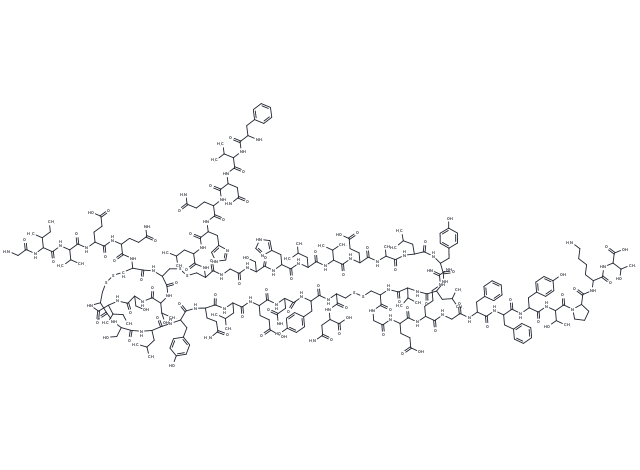Shopping Cart
- Remove All
 Your shopping cart is currently empty
Your shopping cart is currently empty

Insulin (human) is a peptide hormone that promotes glycogen synthesis and regulates glucose levels in the blood. Insulin (human) has hypoglycemic activity and is used clinically to treat hyperglycemia in diabetic patients.

| Pack Size | Price | Availability | Quantity |
|---|---|---|---|
| 5 mg | $30 | In Stock | |
| 10 mg | $40 | In Stock | |
| 25 mg | $62 | In Stock | |
| 50 mg | $78 | In Stock | |
| 100 mg | $97 | In Stock | |
| 200 mg | $138 | In Stock | |
| 500 mg | $233 | In Stock |
| Description | Insulin (human) is a peptide hormone that promotes glycogen synthesis and regulates glucose levels in the blood. Insulin (human) has hypoglycemic activity and is used clinically to treat hyperglycemia in diabetic patients. |
| In vitro | METHODS: Neonatal rat cardiomyocyte NRCMs were incubated with Insulin (100 nM) for 48 h, and the expression levels of target proteins were detected using Western Blot. RESULTS: PE+Insulin treatment resulted in a slight decrease in relative hypertrophic protein levels compared with the PE group. TAC+GAS+Insulin induced a decrease in hypertrophy-associated proteins compared with the TAC+GAS group, and Insulin enhanced the protective effect of GAS against cardiac hypertrophy. [1] METHODS: Bovine aortic endothelial cells bAECs were incubated with Insulin (100 nM) for 10-50 min, and the expression levels of target proteins were detected using the Immunoprecipitation method. RESULTS: Insulin stimulated IRβ Tyr phosphorylation within 10 min and reached a maximum at 30 min, after which it decreased. [2] METHODS: Vascular smooth muscle cells CVSMCs were treated with Insulin (1-100 nM) for 48 h. The expression of RANKL was detected by qRT-PCR. RESULTS: 1 nM Insulin had no effect on the expression of RANKL mRNA. 5 nM Insulin stimulation significantly increased the level of RANKL mRNA, and 10 nM Insulin had the greatest effect on the expression level of RANKL mRNA. At significantly supraphysiologic insulin concentrations, RANKL mRNA levels decreased slightly compared to the maximal effect of Insulin. [3] |
| In vivo | METHODS: To test the antitumor activity in vivo, Insulin (0.035 mg per mouse) and anti-PD1 (0.25 mg per mouse) were intraperitoneally injected into C57BL/6 mice bearing mouse colorectal carcinoma tumor MC38 every two days for five administrations. RESULTS: anti-PD1 significantly inhibited the growth of MC38 tumors, while Insulin promoted the growth of MC38 tumors. The therapeutic effect of the combination of Insulin and anti-PD1 on MC38 tumor suppression was attenuated compared to anti-PD1 treatment alone. anti-PD1 significantly increased the number of infiltrating CD8+ T cells, whereas Insulin significantly decreased the number of tumor-infiltrating CD8+ T cells. [4] METHODS: To study virus-induced insulin-dependent diabetes mellitus (IDDM), Insulin (1 mg) was administered orally to RIP-LCMV tg mice twice a week for two months. RESULTS: Insulin treatment was effective in preventing the progression of islet infiltration to overt IDDM in pre-diabetic tg mice. Oral administration of Insulin did not affect the production of LCMV-NP-specific anti auto-cytotoxic T lymphocytes or the infiltration of lymphocytes into the pancreas. [5] |
| Alias | Insulin(human), INSULIN |
| Molecular Weight | 5807.57 |
| Formula | C257H383N65O77S6 |
| Cas No. | 11061-68-0 |
| Smiles | CCC(C)C1C(=O)NC2CSSCC(C(=O)NC(CSSCC(C(=O)NCC(=O)NC(C(=O)NC(C(=O)NC(C(=O)NC(C(=O)NC(C(=O)NC(C(=O)NC(C(=O)NC(C(=O)NC(C(=O)NC(C(=O)NC(CSSCC(NC(=O)C(NC(=O)C(NC(=O)C(NC(=O)C(NC(=O)C(NC(=O)C(NC(=O)C(NC(=O)C(NC2=O)CO)CC(C)C)CC3=CC=C(C=C3)O)CCC(=O)N)CC(C)C)CCC(=O)O)CC(=O)N)CC4=CC=C(C=C4)O)C(=O)NC(CC(=O)N)C(=O)O)C(=O)NCC(=O)NC(CCC(=O)O)C(=O)NC(CCCNC(=N)N)C(=O)NCC(=O)NC(CC5=CC=CC=C5)C(=O)NC(CC6=CC=CC=C6)C(=O)NC(CC7=CC=C(C=C7)O)C(=O)NC(C(C)O)C(=O)N8CCCC8C(=O)NC(CCCCN)C(=O)NC(C(C)O)C(=O)O)C(C)C)CC(C)C)CC9=CC=C(C=C9)O)CC(C)C)C)CCC(=O)O)C(C)C)CC(C)C)CC2=CNC=N2)CO)NC(=O)C(CC(C)C)NC(=O)C(CC2=CNC=N2)NC(=O)C(CCC(=O)N)NC(=O)C(CC(=O)N)NC(=O)C(C(C)C)NC(=O)C(CC2=CC=CC=C2)N)C(=O)NC(C(=O)NC(C(=O)N1)CO)C(C)O)NC(=O)C(CCC(=O)N)NC(=O)C(CCC(=O)O)NC(=O)C(C(C)C)NC(=O)C(C(C)CC)NC(=O)CN |
| Relative Density. | no data available |
| Storage | store at low temperature,keep away from moisture | Powder: -20°C for 3 years | In solvent: -80°C for 1 year | Shipping with blue ice. | ||||||||||
| Solubility Information | H2O: 16.6 mg/mL (2.86 mM), when pH is adjusted to 3 with 0.01M HCl. | ||||||||||
Solution Preparation Table | |||||||||||
H2O
| |||||||||||

Copyright © 2015-2025 TargetMol Chemicals Inc. All Rights Reserved.